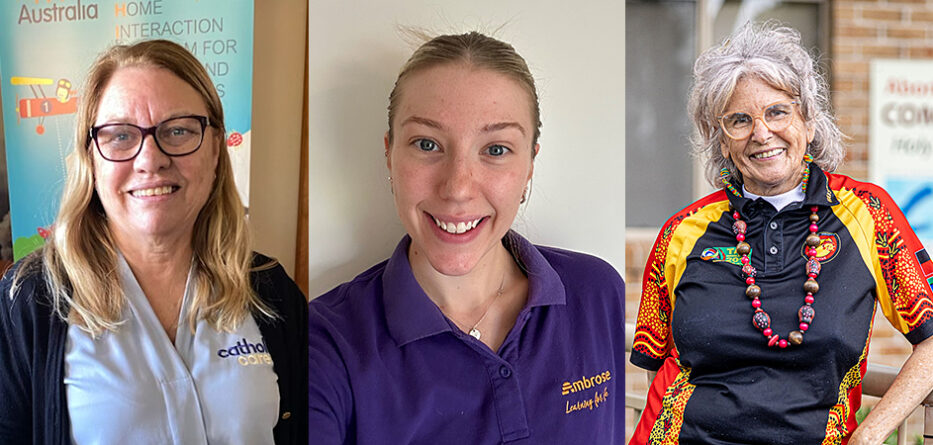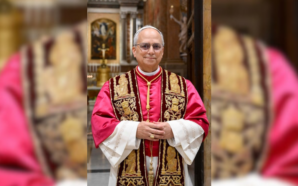On Friday 26 May, we acknowledge that Sorry Day is a poignant reminder of the Stolen Generation – where indigenous children were forcibly removed from their families as part of a government-sanctioned policy spanning almost a century, which led to the forced assimilation of Aboriginal children into white society. The consequences of this policy were devastating, causing personal trauma, intergenerational suffering, and loss of Aboriginal identity.
We asked some members of our Diocesan agencies for their reflections on Reconciliation.
Linda Macdonald, Coordinator of the Hippy Program for Aboriginal Catholic Care in Emerton explains:
“In 1974, I remember my Aunties telling me, ‘Live in the white world until it is safe to be Aboriginal’,” she says. “There was less conversation about what Aboriginal people went through. I did know that I was Aboriginal I was not bought up knowing where I was from or who was my Aboriginal family. I thought that everyone was Aboriginal.
“I grew up wanting everyone to be as one culture – no one is different. I believe reconciliation is a part of this theology. I believe that Aboriginal people suffered in education, trauma, and displacement, during the past policies.”
Aunty Rhonda, a dedicated volunteer at Aboriginal Catholic Care, Emerton reflects upon the effect such displacement has had on the Aboriginal community.
“It’s a very sad and difficult thing to talk about. I still yearn when I see it for myself in movies, documentaries, or when people are talking about it,” she admits. “It’s something no one should ever have to go through – separating family… but we need to talk about it – no matter how difficult. That’s how we help each other”.
How to support Reconciliation
Since Prime Minister Kevin Rudd’s address to the Indigenous Australians in 2008 – a speech now known as the National Apology – there have been consistent and significant efforts to increase conversation and promote reconciliation. We asked what the rest of the community could do to be part of the Reconciliation process.
“Acknowledging the First Nation People and what was done to them is wrong is the start,” says Aunty Rhonda. “Once that’s done, it means something to each and every one of us – even if we personally were not affected by it.”
Tiana Ross – Educator at Ambrose – agrees that attitudes towards Aboriginal people have improved in recent years, but acknowledges that there is still more to learn before true reconciliation can be achieved.
“Reconciliation is the act of acknowledging that Aboriginal and Torres Strait Islander Peoples were the First Peoples of the land,” she states. “Once this is accepted, we acknowledge the adverse effect colonisation has had on the continuation of culture and health outcomes for Aboriginal and Torres Strait Islander Peoples.”
Recognise the impacts on Aboriginal People’s mental health
For many Aboriginal people, mental health is a concern due to the displacement caused by the systematic removal of children from their families; this is heightened when an individual lacks a strong cultural identity, or when forced to assimilate into an oppositional environment. Likewise, feeling a sense of belonging and identifying with a culture is proven to improve mental health.
Linda recalls the time she escaped her toxic workplace due to relentless bullying. With the help of her Aunties, she was taken to the Northern Territory to reconnect with the Aboriginal culture she’d been forced to leave behind.
“They took me to Uluru and encouraged me to touch the wall. I remember the incredibly spiritual feeling that rushed through my body when my fingers touched the rock. I cried!
“The Aunties held me as I cried. ‘You’re home now,’ they said. That meant everything to me. It was the first time I felt completely connected to my Aboriginality.”
Take part in local events
With Sorry Day and National Reconciliation Week upon us, non-indigenous Australians are encouraged to take part in local community events that promote unity, mutual respect, and understanding between indigenous and non-indigenous Australians.
“My university organises educational sessions and a lunch for Aboriginal and Torres Strait Islander students,” says Tiana. “We can chat about the day and share our experiences, so this is something I will do, and invite my non-indigenous friends along, too.”
Likewise, Linda plans to attend the Holy Family Reconciliation – a walk held every year trailing from the Holy Family Church down to central Mt Druitt.
“It’s a Reconciliation group that walks together with members of the community,” shares Linda. “Sometimes it’s quite a big march. I expect it will be the same this year.”
Find resources and information
On the other hand, Aunty Rhonda notes there is an opportunity to further the conversation throughout the wider community.
“What I’d love to see are badges,” she points out. “Imagine people wearing ‘Sorry Day’ badges to endorse discussion. The media could do a great thing by promoting this.
“In the meantime though, I encourage non-indigenous Australians who are keen to help support reconciliation to check out NITV, ABC and even Facebook groups on the topic. There are plenty of great, free resources out there. They could also visit their local council to meet with a Koori worker, or one of the Aboriginal communities in their area.”
Reach out to Reconciliation Australia
Non-indigenous Australians hoping to deepen their understanding of the suffering of Aboriginal people and foster reconciliation can also make contact with Reconciliation Australia, says Linda. “They will always guide people with where to go if they’re not Aboriginal.”
She continues, “Non-indigenous Australians and even businesses can also create a Reconciliation Action Plan (RAP) in consultation with the organisation. These are plans that help you to embed the principles and purpose of reconciliation into the community in a practical way.”
RELATED: Aboriginal Catholic Care helping First Nations People through tough times
Aboriginal Catholic Care provides a community drop-in centre for First Nations People in Western Sydney so they can access practical assistance and learning opportunities. Your generosity will help First Nations People in need and provide life-changing support.
Find out more about how you can donate to Aboriginal Catholic Care with a donation to the Bishop’s Good Samaritan Appeal by calling (02) 8838 3482 or visiting yourcatholicfoundation.org.au/bishops-samaritan-co-appeal-23
Belinda Harding is a freelance writer.








